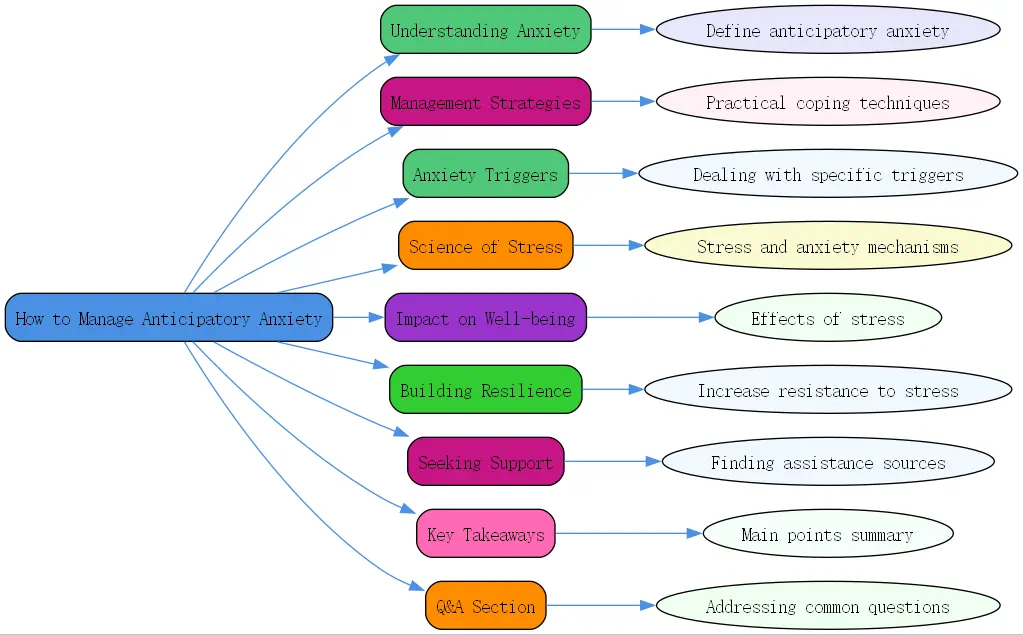How to Manage Anticipatory Anxiety: A Comprehensive Guide

Understanding Anticipatory Anxiety
What is Anticipatory Anxiety? Anticipatory anxiety is a feeling of unease and worry about future events. It often manifests as a heightened state of alertness or dread, particularly when facing uncertainty. This type of anxiety can be overwhelming, leading individuals to avoid situations that trigger these feelings, which can ultimately hinder personal growth and opportunities.
Triggers and Causes Common triggers for anticipatory anxiety include academic stress, social situations, and the inherent uncertainty associated with new experiences. For instance, starting university can be particularly anxiety-inducing as students navigate unfamiliar environments, new academic expectations, and social dynamics. Understanding these triggers is crucial for developing effective coping strategies.
The Role of Uncertainty Uncertainty exacerbates anxiety, especially during significant life transitions like starting university. The unknown can create a breeding ground for negative thoughts and fears. Recognizing that uncertainty is a natural part of life can help individuals manage their anticipatory anxiety more effectively.
Practical Strategies for Managing Anxiety
Mindfulness and Grounding Techniques Mindfulness practices, such as meditation and deep breathing, can significantly reduce anxiety. Grounding techniques, like focusing on the present moment or engaging the senses, help anchor individuals during anxious episodes. These practices encourage a shift in focus from anxious thoughts to the immediate environment, fostering a sense of calm.
Cognitive Restructuring Cognitive restructuring involves identifying and challenging negative thought patterns. By reframing anxious thoughts into more positive or realistic perspectives, individuals can diminish the power of their anticipatory anxiety. For example, instead of thinking, “”I will fail my exams,”” one might reframe it to, “”I can prepare effectively and do my best.””
Time Management and Organization Effective time management is essential for alleviating anxiety related to deadlines and responsibilities. Creating a structured schedule that includes time for study, relaxation, and social activities can help individuals feel more in control. By breaking tasks into manageable steps, students can reduce the overwhelming feeling of having too much to do at once.
Coping with Specific Anxiety Triggers
How to Manage Driving Anxiety Driving anxiety can be particularly challenging. Techniques such as gradual exposure, where individuals slowly increase their driving experiences, can help. Additionally, practicing relaxation techniques before and during driving can ease tension. It’s also beneficial to familiarize oneself with the route beforehand to reduce uncertainty.
How to Manage ADHD Anxiety Managing anxiety alongside ADHD requires tailored strategies. Techniques such as breaking tasks into smaller, achievable goals and using visual aids can help maintain focus and reduce feelings of overwhelm. Incorporating regular physical activity can also alleviate anxiety symptoms and improve concentration.

Social Anxiety Management Navigating social situations can be daunting for those with anticipatory anxiety. Preparing for social interactions by practicing conversation starters or role-playing can build confidence. Additionally, focusing on the positive aspects of socializing, such as making new friends, can help shift the focus away from anxiety.
The Science Behind Stress and Anxiety
Stress: Friend or Foe? Understanding the relationship between stress, arousal, and performance is crucial. The Yerkes-Dodson Law illustrates that a certain level of stress can enhance performance; however, too much stress can lead to decreased performance. Recognizing this balance is key to managing anticipatory anxiety effectively.
Optimal Stress Levels Finding the right balance of stress is essential for peak performance. Techniques such as setting realistic goals and practicing self-care can help individuals maintain optimal stress levels, ensuring that anxiety does not become overwhelming.
The Impact of Stress on Your Well-being
Psychological Effects Stress can lead to rumination, intrusive thoughts, and mood changes. These psychological effects can exacerbate anticipatory anxiety, creating a cycle of worry and stress. Acknowledging these effects is the first step toward managing them effectively.
Physical Symptoms Anticipatory anxiety can manifest in various physical symptoms, including headaches, sleeplessness, and stomach problems. Recognizing these symptoms as part of the anxiety experience can help individuals understand their bodies better and seek appropriate relief.
Behavioral Changes Stress influences behavior, often leading to unhealthy coping mechanisms such as overeating, substance use, or social withdrawal. Identifying these behaviors is crucial for developing healthier strategies for managing stress and anxiety.

Building Resilience and Seeking Support
Emotional Regulation Systems Understanding emotional regulation systems, such as the threat response (fight-flight-freeze), can aid in managing anticipatory anxiety. Recognizing when these systems are activated allows individuals to implement coping strategies effectively.
Harnessing the Drive System Utilizing motivation and reward systems can help balance the threat response. Setting achievable goals and celebrating small victories can enhance motivation and reduce feelings of anxiety.
The Soothing System Activating feelings of safety, contentment, and connection is vital for managing anxiety. Engaging in activities that promote relaxation and joy can help soothe the nervous system and mitigate anxiety symptoms.
Accessing Support
Counseling Services Professional support, such as counseling services, is invaluable for managing anticipatory anxiety. Many universities offer resources to help students navigate their mental health challenges.
Building a Support Network Connecting with friends, family, and peers can provide essential emotional support. Sharing experiences and feelings with others can alleviate feelings of isolation and anxiety.
Self-Care Practices Incorporating self-care practices, such as relaxation techniques, hobbies, and healthy habits, into daily routines can significantly improve overall well-being. Prioritizing self-care is crucial for maintaining mental health and managing anxiety.
Key Takeaways
- Understand anticipatory anxiety and its triggers.
- Implement mindfulness and cognitive restructuring techniques.
- Manage specific anxiety triggers like driving and ADHD.
- Recognize the balance between stress and performance.
- Seek support through counseling and social networks.
Q&A Section
Q: What are some effective ways to manage anticipatory anxiety? A: Effective strategies include mindfulness practices, cognitive restructuring to challenge negative thoughts, and time management to reduce overwhelming feelings. Engaging in self-care and seeking support from friends or professionals can also be beneficial.





